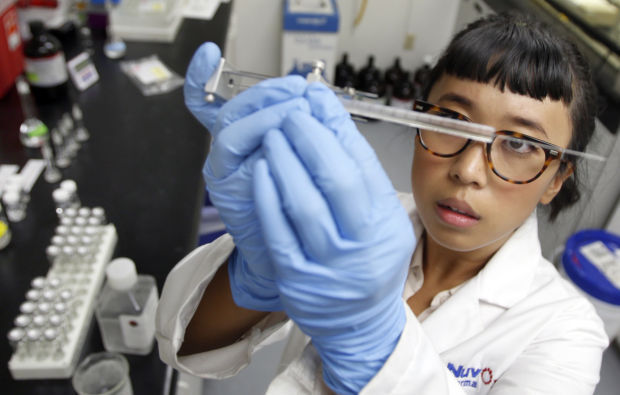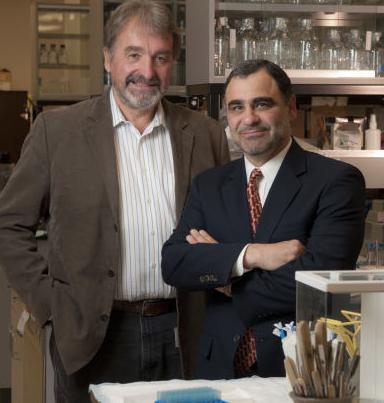Tucson won’t join San Francisco or Boston on the list of top global drug-development centers anytime soon.
But two local startup companies founded by University of Arizona faculty researchers are in human clinical trials that could result in new drug approvals in the next few years, while another UA spinoff is planning critical trials.
Tucson-based biotech startup NuvOx Pharma has begun a Phase Ib clinical trial of its new drug — an oxygen-delivery agent — in patients with glioblastoma multiforme, a rare but particularly deadly form of brain cancer.
Locally-based Cancer Prevention Pharmaceuticals Inc. is in the middle of a three-year, late-stage clinical trial of its drug designed to prevent the recurrence of colon cancer or precancerous colon polyps.
And Valley Fever Solutions, which is working on a new class of antifungals to treat its namesake disease, is looking to start new clinical trials next year.
Local biosciences industry leaders say the companies’ progress in navigating the long and costly drug-approval process is noteworthy, as they progress through trials at the same time.
“I don’t remember a time when we’ve had so many companies this far along,” said Nina Ossanna, chairman of the Bio Industry Organization of Southern Arizona and former head of business development at the UA’s Bio5 drug institute.
Ossanna said the local drug-trials push is exciting, but it doesn’t mean Tucson is suddenly ready to become a big player in new-drug development, or the headquarters of the next pharma giant.
“There’s always this low level of activity around, and if something really big comes of it, it will probably be picked up by one of the bigger drug companies,” she said.
Dr. Raymond Woosley, founding president of the Arizona Center for Education and Research on Therapeutics, said it’s no wonder smaller research centers have a tough time taking drugs to approval.
“It costs a ton of money, and it’s a high-risk endeavor,” said Woosley, founder and former president of the Tucson-based Critical Path Institute, a drug-research partnership of the UA and the U.S. Food and Drug Adminisration.
He cited a study several years ago showing that it took major drug companies 10 years and more than $1 billion to bring a drug to market, while the FDA only approves about 20 new drugs each year.
“To me, it kind of reflects the cowboy spirit out here,” he said of the parallel progress of the local drug startups.
NUVOX PHARMA
Though it’s a significant accomplishment for any drug startup to reach clinical trials, many drug candidates fail after negative results in early trials.
NuvOx’s founder and CEO, UA radiologist Dr. Evan Unger, knows that all too well.
In the early 1990s, Unger developed gas-filled “microbubbles” as a contrast agent for medical imaging, and sold the company and its technology to chemicals giant DuPont for about $40 million in 1999. Unger started another company that tried to adapt the technology for use with ultrasound instruments to break up blood clots.
But after raising millions of dollars from private investors and a public stock offering, ImaRx Therapeutics suspended trials of its therapy along with another drug after some patients in a 2008 clinical trial unexpectedly developed cranial bleeding. The company looked to start a new trial, but it never recovered.
Unger believes his microbubble technology shows great promise as a way to deliver therapies.
In the recently started Australian trial, NuvOx has set out initially to prove that its drug candidate, NVX-108, can help treat tumors by delivering oxygen to reverse a low-oxygen condition that makes them resistant to radiation therapy.
“It raises the oxygen level, and so overcomes radiation resistance,” Unger said, noting that it takes three times more radiation to treat low-oxygen, or hypoxic, tumors. “Brain tumors are known to be hypoxic, and radiation is the standard therapy.”
But many other kinds of cancer tumors are known to by hypoxic as well, so the drug could have wide uses, said Unger, who co-leads the cancer imaging program at the Arizona Cancer Center.
If all goes well with the Australian trial, NuvOx plans to file an investigational new drug application with the FDA and mount a Phase IIb trial in the U.S.
The company was recently issued a U.S. patent for its core technology, “buffered formulations of dodecafluoropentane emulsion,” and is already exploring the oxygen-delivery therapy to treat other cancers and diseases.
Last week, NuvOx announced it was awarded a $225,000 Phase I Small Business Innovative Research contract by the National Heart, Lung, and Blood Institute to develop its technology for the detection and treatment of atherosclerosis, a disease that causes heart attacks and strokes.
While Unger acknowledged the failure of ImaRx was painful, he’s optimistic about NuvOx.
“I’m batting .500, because the first one was a success; I just hope what we’re working on now will be successful,” Unger said.
CANCER PREVENTION
Tucson-based Cancer Prevention Pharmaceuticals is in the middle of a three-year, Phase III colon-cancer-prevention trial in collaboration with the National Cancer Institute and an NCI-supported clinical-trials group.
The company was co-founded by Eugene Gerner, a University of Arizona professor emeritus, Arizona Cancer Center member and the company’s chief scientific officer.
The Phase III clinical trial — typically the final trial phase before regulatory approval — is testing the company’s drug (known as CPP-1X/sul, or eflornithine/sulindac) in 1,340 colon-cancer survivors who are getting daily treatment to prevent the recurrence of cancer or high-risk polyps.
The trial is taking place at more than 200 sites around the country, including the University of Arizona and the Mayo Clinic.
In January, the company announced it had signed an exclusive licensing agreement with a Swiss drug company for European and Japanese rights to its drug combination for gastrointestinal cancer prevention.
A Phase III clinical trial started in Europe last year.
In December, the company launched a Phase III clinical trial of its drug combo versus CPP-1X and sulindac as single agents in 150 patients with familial adenomatous polyposis, an inherited condition that causes cancer of the large intestine (colon) and rectum.
The company is also looking to launch clinical trials of the drug combo for treatment of neuroblastoma, a cancer of nerve cells that occurs in young children.
Cancer Prevention CEO Jeff Jacob said it still may take a few years to finish the trials needed to apply for approval, but that process could be accelerated for childhood neuroblastoma.
V
ALLEY FEVER
Another Tucson company with UA ties is developing better and safer treatments for valley fever, a sometimes debilitating fungal disease that is contracted through the lungs.
Valley Fever Solutions has developed Nikkomycin Z, the first of a new class of antifungals that has shown promise to cause minimal side effects compared with current therapies for valley fever.
The technology was originally developed by a scientist at drug giant Bayer in the 1990s and later acquired by the UA. It has been further developed by Dr. John Galgiani, director of Valley Fever Center for Excellence and the company’s co-founder and chief medical officer, and other UA researchers whose Phase I safety trials were conducted several years ago.
The company recently was awarded a $1.7 million grant from the National Institutes of Health to study patients with mild pneumonia stemming from valley fever, CEO David Larwood said.
The company is raising money to start a new Phase II trial under that grant next year, provided it can raise money to obtain more of the drug, said Larwood, a chemist and lawyer with an MBA.
The company is planning two other trials, one in collaboration with NIH to study certain patients who are seriously ill with valley fever, and one for moderately, chronically sick patients, Larwood said.
Valley Fever Solutions has raised more than $5 million through grants so far, but it needs $2 million in investment capital to launch trials next year and another $2 million for later trials, Larwood said.
The company could mount a so-called “pivotal” clinical trial — one that could lead to market approval — within a couple of years.
“If all goes well, it’s quite conceivable that we could start a pivotal trial in 2016,” he said.





